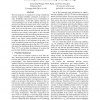Free Online Productivity Tools
i2Speak
i2Symbol
i2OCR
iTex2Img
iWeb2Print
iWeb2Shot
i2Type
iPdf2Split
iPdf2Merge
i2Bopomofo
i2Arabic
i2Style
i2Image
i2PDF
iLatex2Rtf
Sci2ools
118
click to vote
OSDI
2008
ACM
2008
ACM
On the Impact of Disk Scrubbing on Energy Savings
The increasing use of computers for saving valuable data imposes stringent reliability constraints on storage systems. Reliability improvement via use of redundancy is a common practice. As the disk capacity improves, advanced techniques such as disk scrubbing are being employed to proactively fix latent sector errors. These techniques utilize the disk idle time for reliability improvement. However, the idle time is a key to dynamic energy management that detects such idle periods and turns-off the disks to save energy. In this paper, we are concerned with the distribution of the disk idle periods between reliability and energy management tasks. For this purpose, we define a new metric, energy-reliability product (ERP), to capture the effect of one technique on the other. Our initial investigation using trace-driven simulations of typical enterprise applications shows that the ERP is a suitable metric for identifying efficient idle period utilization. Thus, ERP can facilitate developm...
Disk Idle Periods | Disk Idle Time | Operating System | OSDI 2008 | Stringent Reliability Constraints |
| Added | 03 Dec 2009 |
| Updated | 03 Dec 2009 |
| Type | Conference |
| Year | 2008 |
| Where | OSDI |
| Authors | Guanying Wang, Ali Raza Butt, Chris Gniady |
Comments (0)

